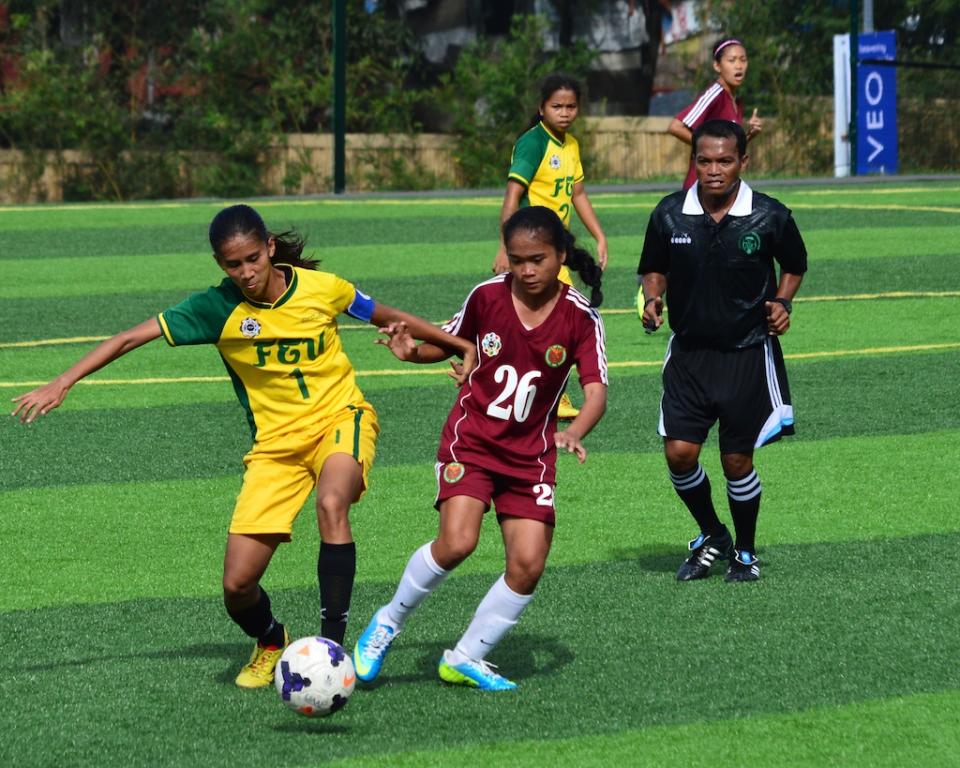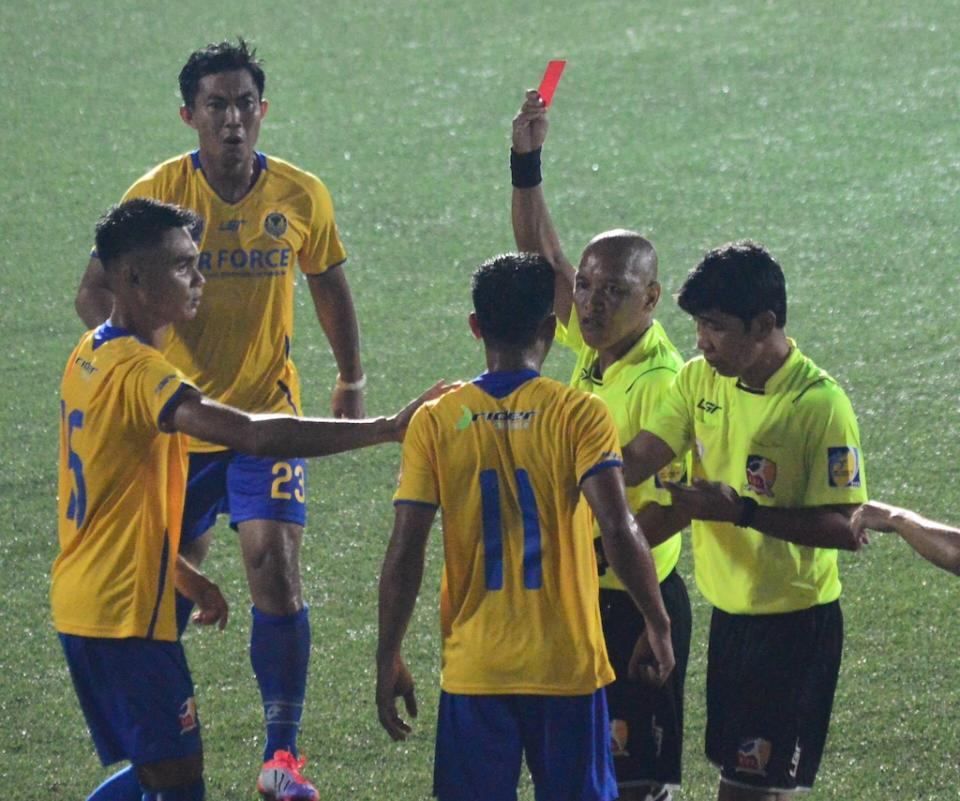Why can’t we have better Football refereeing? Part 1
This is the first of a three-part special report on The Passionate Fan about the state of Football refereeing in the Philippines.
Pinoy Football fans disagree on lots of issues. Like 'who is the best striker in the country,' 'who should be in the Azkals,' and 'what team will likely win the UFL league.' However most keen fans are one when it comes to one subject: the standard of the refereeing is wanting.
I've caught some rather egregious decisions in recent times. I've seen a foul committed by a defensive player three meters inside the penalty box and a free kick given just outside, instead of a penalty. I witnessed red cards given to the wrong players, fouls given to players with their backs turned on the play, and woefully insufficient stoppage time given on halves that had plenty of incidents and injuries.
There have also been penalties given on the most blatant of simulations, and a non-call when a player was bloodied by an elbow away from the ball.
One player commented on Facebook that there is one referee who told him it was illegal to block the view of the goalkeeper on a free kick. I overheard another player say there is an assistant referee who calls offside on throw-ins.
It seems that in almost every game there is one utterly shambolic call or non-call.
ALSO READ: Cristiano Ronaldo dedicates double to Eusebio.
Yes, the officiating needs to improve as the sport grows by leaps and bounds in the Philippines. But the question that is on my mind is this: is the officiating any worse than any other aspect of Pinoy Football? In my opinion, no.
Put another way, is our refereeing any better than our play, our coaching, our league administration, and our promotion of the game? I would say perhaps not.
A bad referee is like a bad bassist in a band. You only notice him if he's making lots of mistakes. The best officials (and bassists) are invisible. Meanwhile, errors and deficiencies in other facets of Football get hidden more easily.
We're all learning how to do this Football thing right. Our Football is still light-years behind what you see in our neighboring countries, more so compared to top Asian countries. Players are learning how to play. Coaches are learning to coach. Administers are learning to administer. And judging from the well-meaning comments I've been getting from experienced Football guys, folks like me have a long way to go when it comes to writing and commentating on Football.
Naturally, our referees are learning how to referee too. In a sense, we are getting the refereeing we deserve. If our nation cannot produce Lionel Messis, then it's unreasonable to ask it to pop out lots of Pierluigi Collinas.
Another thing that must be made clear is that refereeing Football is, by many measures, a rather crappy job.
ALSO READ: JR Smith unties Shawn Marion's shoe just before a free throw. (Video.)
For ninety minutes you have to run around chasing very athletic, quick, men and women, plus you have to see every little thing that happens on the field. You have to be focused for 5400 seconds. 5399 seconds is not enough, or you might miss a game-changing play.
And of course, all of this while vitriol from players, fans and coaches enters one ear and hopefully exits the other. There are many kinds of jobs, but very few where you're getting angry criticism every few minutes.
People sometimes forget the obvious: that refs are human beings, capable of mistakes, who are just out there trying to make a living like the rest of us.
Yes we love to hurl abuse at the referee. It's a part of sport, isn't it? And it goes on everywhere, right? Well, not really.
Emil Balidio is a Filipino referee from Tondo. In 2011 he officiated two of the most important matches in the Philippine sports calendar, the UAAP Final match that UP won over UST, and the last game of the UFL league, which saw Air Force retain the UFL league title by drawing Global 1-1. Balidio performed well in both games.
Why don't we see Balidio in the UFL or the UAAP anymore? Because he has emigrated to Canada, where he drives a forklift for a living in Winnipeg, Manitoba. On weekends he referees in the local leagues, where he noticed a big difference in how players and fans treated officials.
He once shared this to me over a Facebook chat. “Sa nakikita ko dito (Canada), ang level ng officiating parehas lang din sa atin. Yung difference lang ang attitude ng players at coaches. Napaka-professional nila dito. Ang respeto ng player sa ref, maganda. Sa atin, kulang pa.”
(From what I see here, the level of officiating is the same as it is in the Philippines. The big difference is the attitude of the players and coaches. They are very professional. There's a lot of respect from the players to the refs. In the Philippines, that is still lacking.)
ALSO READ: Source: Rey Madrid to keep UP coaching job.
This sentiment is echoed by Sally Jo Bellosillo, who played for UP in the UAAP and for Birmingham College in England.
“From my experience, players and fans really respect refereeing as a profession in England” she says.
This is in stark contrast to how refs are abused here. This past year saw assistant referee Ronaldo Yurag get kicked by Army's Rodrigo Betita in one UFL game, and in the UAAP, main referee Edgardo Refuerzo had stones thrown at him by an FEU women's player, who had earlier been red-carded and came back on to the field in street clothes.
I'd be a rich man if I had a peso for every curse word aimed at referees every week. So yes, it's true. Bad refereeing is partly our fault. We have created a toxic environment for our officials to do their job. If we make their workplace so hostile, who would want to do this very important work?
Another criticism leveled on referees is that they are biased towards certain teams and players. Time and time again we hear shouts of “ref, magkano?” (ref, how much) during games from fans. In my opinion, this is a harsh and unfair accusation with very little basis.
I have yet to see any definitive proof that any team or group of players regularly receives favor from Pinoy match officials. A widespread belief among some is that military teams are given leeway by the refs. I cannot conclusively say this is true. Perhaps a scientific study could shed more light on this, but recent events show otherwise.
In the recently concluded UFL Cup, Air Force was well and truly hosed by the refs when they handed out four red cards to the airmen after the melee with Stallion, with at least one of them due to a case of mistaken identity.
In the semifinal, Air Force's Joel Ballo-allo was given what seemed to be a harsh red after an incident with Pachanga's Nate Burkey. Then when Airman Bulldog Albor was felled in the box, no penalty was given.
Army players also bellyache about refereeing. On a few occasions I have heard their players rail about how the refs have a bias for foreigners and Filipino-foreigners at the expense of homegrown players.
From what I can see, everybody complains about the refereeing equally. That tells me that there is no bias, just poor officiating all around for everyone.
But blaming the individual referees is not really fair. Let me explain in the upcoming second part of this series.
Follow Bob on Twitter @PassionateFanPH.





